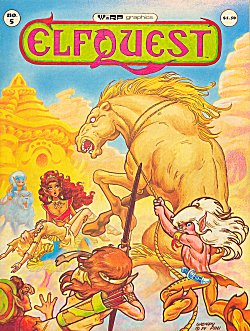In a Fantasy setting, how do you define what is "normal" and what is wondrous or uncanny? To successfully have any sense of fear or mystery in a game, you need to establish a baseline of normalcy to contrast the really weird stuff. This is true in any medium of storytelling. But it presents particular challenges in D&D, where genre-savviness is the norm, and objects and ideas which should be really, really strange have been thoroughly codified and de-mystified by decades of rulebooks and supplements.
In a typical D&D setting, it is as if every graveyard is haunted, kobolds could pop out of the floorboards at anytime without anyone being really shocked, wizards step in and out of other dimensions like they are getting breakfast, and those mysterious, uncanny elves...well there are actually a few drinking and yukking it up in the inn where you are staying.
A dungeon master has to put some actual thought into how to subvert or avoid the tropes.
In a recent campaign, our party came to some foothills where basilisks and achaierai were milling about. Because this was D&D, the presence of these fantastic beasts was not surprising. The surprising part was that they didn't seem to mind us being there. Why weren't they killing us? There was a mystery afoot, and I think it was one of my favorite moments playing in that campaign.
Or consider the source material that gets all the credit; Lord of the Rings. "Fellowship" starts pretty slow; a long expected party and plain little hobbits and idealized pastoralism written of in a sing-songy grandfatherly tone. At this point in the story, Elves are numinous creatures, interchangeable with fairies in the average hobbit-mind. This sets the baseline of normalcy. But then the stakes get raised. The poor little hobbits are rushed onto the road without much explanation. They have their first encounter with a Black Rider. The hobbits are nearly powerless; avoidance is their best strategy. And it is genuinely scary. Only when we get to the Council of Elrond does the tension abate. The hobbits and the audience are finally clued in on the scope of the conflict. And the conflict is pretty large, but understanding something about it does a lot to eliminate the tension. At this point in the story, the elves entertain us at dinner and change our linens. Ignorance in the face of potential danger is a key element of that delicious fear we were experiencing earlier. Familiarity on the other hand, breeds contempt.
oldest emotion fear fear of unknown Lovecraft and so on
But if played well, familiarity can breed even more, deeper fear:
(whimper)
A big aspect of establishing what is normal in a setting is the races and classes which are available to PCs. This why it is perhaps NOT a good idea to have tieflings and half-dragons and drow-elves and magic-robots in the core rulebook. It will inevitably demystify all of these ideas.
Let us consider Professor T's very own race of immortal Mary Sues: the elves. the Elves of their native Norse mythology lived in Asgard and served as the helpers and servants of the gods. They were essentially divine in themselves. It was these creatures which Tolkien was trying to interpret in his own writings. In Medieval Europe, after the spread of Christianity, elves were demonized. I dare say a lot of people believed in them, but feared them or any possible interaction with them. Now that makes for good weird fantasy! Then you get D&D, and an elf is suddenly a skinny punk with a d6 hit-die, who takes himself too seriously and gets pushed around by the dwarf who has a sturdier center of gravity. It's a bit of a step down from divinity. Elves have gotten so cliché that even saying "My elves are different." has become a cliché.

My Elves Are Different: the manga
I'm not saying we should get rid of elves as a default playable race. That ship done sailed. I'm just saying that when everything in the setting gets taken for granted, it becomes difficult to have any really meaningful fantasy. Attempting to create new ideas can come off as more bizarre and gonzo than genuinely interesting.
It's fantasy saturation. They've got a glass of water and put as much kool-aid in it as will dissolve. It. Can't. Get. Any. Kooler.
If it seems like I am always trying to deconstruct D&D, this is the reason why. D&D has become a setting as well as a system. I am picking through the assumptions that have been built into it in hopes that the baseline for normalcy can be reset. I believe that if that baseline can be reset, we will have new frontiers of mystery and danger to explore. Question your assumptions, says I.
Btw. In that campaign with the disconcertingly docile monsters; the Elves were the bad guys in the end. Elves do make good villains.


I've never especially liked elves. I have considerably reduced them in power; because that's what you must do to make them playable and not 'mary-sue' as you say.
ReplyDeleteThe stronger point of things having to possess a 'normal' baseline is a good one. It can be accomplished by not having everything out to attack the parties, by giving the parties friends, by having actual explanations for what the party sees rather than handwaving ones and most of all by presenting all the npc's and monsters as actual creatures would if they lived in an actual world.
Fantasy is no excuse for lampshading.